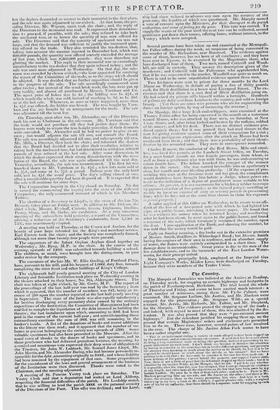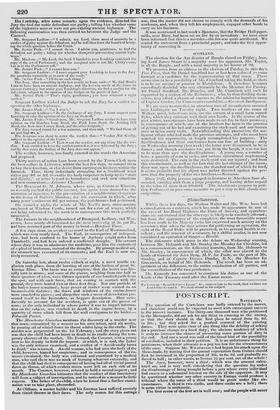Eby. Country.
The Marquis of Downshire was indicted at the Assizes at Reading, on Thursday week, for stopping up certain highways and footpaths in the parish of Eastliampstead, Berkshire. The trial lasted the whole of Thursday and Friday, and seems to have excited much interest : a great number of witnesses, tunong them Mr. Fyslie Palmer, were examined. Mr. Sergeant Ludlow, Mr. Justice, and Mr. Maclean were angaged for the prosecution ; Mr. Sergeant Wilde, on a special retainer, Mr. Jervis, Mr. Richards, Mr. Talbot, and Mr. Shepherd, for the Marquis. Flat evidence proved the stopping up of the roads ; and indeed, with regard to most of them, this was admitted by the defendant. It was also proved that they were " pre-existent ancient highways." But the defendant justified his stopping them up, on the
ground that certain Magistrates' orders and enclosure acts permitted him to do so. There were, however, several points of law involved in the case. .The charge of Mr. Justice Allan Park seems to have been a lather singular one.
" This is an indictment stating a variety of roads alleged to have been stopped up. by the defendant, and it contains twenty-oneyounts. A good dcd has been said .iihout. its being a very convenient mode or trying Ins question, instead or proceeding uy so. partite indictment for each road. I don t think so; because it distracts the attention by having to consider nt the same time ten or twelve different questions. and prevents the attorney from knowing as much about the matter as he sleuth!, for how is it to be tpt'rtel Ii, should krrow is iuuieit about the nitt:;111 14ss 711a11:7;41.: woVtinvi .; t)( i e.e ni know nothing of the parties ; I never beheld the pnmerty, and suppme I never shall. Now. there is not a tittle of moot that the defendant stopped up those roads ; hut it is illmitted by my brother Wilde, (or the Marquis, that he did. I put it to you whether it is possible, after the time this ease has occupied, that I can go through the evidence at any length, and enter into all the objections on the law that have }well made by my mother Ludlow. Ito says he is shot at from both sides ; and so be is. There is Mr. Maclean prompting hint nu one side, and Mr. Justice on the other ; and there is Mr. Jeyes, the atturney. there in the corner, prompting him also. A MI hero is a book home up ia my taco. a book 01 Mr. Chitty's, a special pleader only, unit a marginal note of his f..n an, authority, that there shouhl be a separate order for stopplug up each
His Lordship, after some remarks upon the evidence, directed the Jury the find the noble defendant not guilty; telling him whether some of the highways were or were not pre-existing ancient highways. The following conversation was then carried on between the Judge and the Counsel.
Mr. Sergeant Ludlow--" I submit, my Lord, there must of necessity he a verdict of guilty against the defendant, and he will then have the benefit of bringing the whole question before the Court." Mr. Justice Park—" I cannot do so. I advise you, gentlemen, to find the defendant not guilty ; telling rue whether these,awere pre-existiug ancient highways." Mr. Maclean—" My Lord, the book I handed to your Lordship contained the copy of the net of Parliament ; and the marginal note is not Mr. Chitty's note, but is in the Parliament roll."
Mr. Justice Park—" I cannot hear you." Mr. Sergeant Ludlow—" I must request your Lordship to leave to the Jury the questions separately as to each of the roads." .'u dice Par k.--" Ill do no such thing."
The Jury, after consulting in the box nearly an hour, said—" We find Bond's Lane to have been au ancient highway, and the footway north of the home an ancient budway ; but under your Lordship's direction, we find a verdict for the defeudant, subject to the opinion of the Judges on the points of law."
Mr. Justice Park—" That's right, gentlemen ; you have returned a right verdict."
Sergeant Ludlow wished the Judge to ask the Jury for a verdict respecting; the other highways.
Mr. Justice Park—" No, I won't."
Mr. Sergeant Ludlow—" In the discharge of my duty, I must request your Lordship to take the opinion of the Jury on them all." Mr. Justice Park—" Gentlemen, Mr. Sergeant Ludlow wishes to have your opinion un the Hatches Lane Road, the Park Lane Road, the Jeuning Road, the Yew-tree Corner Road, and the other footpath."
The Jury turned round for a few minutes, and then said, " We find them all awient higl wa s." The Associate was about to enter the verdict thus—" Verdict Not Guilty, subject to the mllliuion of the Court." Mr. Sergeant Ludlow—" That is not the verdict, nor any thing like the verdict. I am entitled to have the verdict entered as it was delivered by the Jury ; and by that entry the finding of the Jury does not appear."
The verdict, however, was filially entered in the words the Associate bad proposed.
Thirty notices of action have been served by the Town-Clerk upon the beer-sellers in Leicester, within the last few days, to compel them to buy their freedom, or else desist from carrying on business within the borough. Thus, thirty individuals struggling for a livelihood must either pay 311. or 401. to enable the body corporate to keep up its "state and dignity," or retire beyond its boundaries and seek new situations and new connexions.—Leicester Chronicle.
The Reverend G. M. Johnson, whose case, as Curate at Kinetor, so recently excited the piddle interest, has again been doomed to the visitation of injustiee, by the presentation of a neighbouring clergyman to the ii, ieg of Butler's Marston ; for his succession to Ititivh, after many years' services on 401. per annum, the parishionershad petitioned.
( in Saturday night, the whole of Mr. Noell's men, stone-masons employed at Windsor Castle, turned out for a rise of wages ; which not being submitted to, the work is in consequence this week partially suspended.
The farmers in the neighbourhood of Bromyard, Ledbury, and Worcester, have nearly all bargained for the next year's clip at •2s. per lb., and have received part of the money in hand.—Herefird Times.
A few days since, an accident oceurred to the Fail of Westmoreland, which was very nearly fatal. The Earl, in consequence of indisposition, had been confined to his house at Apthorp (eight miles from Stamford), and bad been ordered a medicinal draught. The servant avhose duty it was to administer the medicine, gave him the contents of of a phial of laudanum, instead of the draught. By prompt medical aid, the stomach was evacuated of its contents ; and the Earl is now entirely recovered.

















 Previous page
Previous page